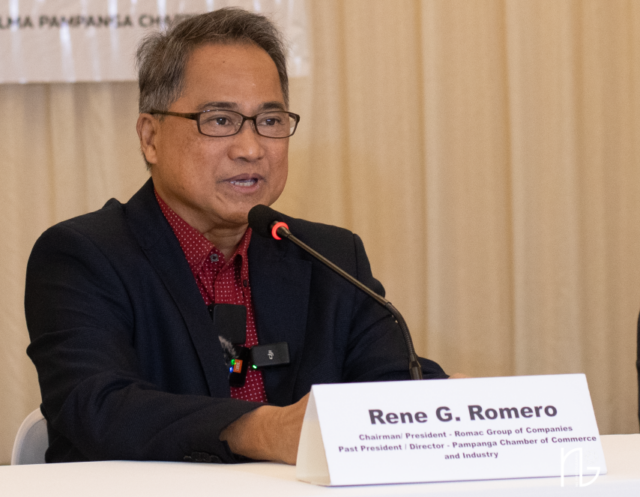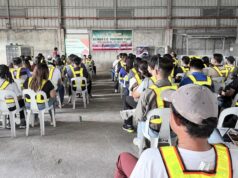FOR THE past several years, I have been an advocate for increasing the daily wage of Filipino workers, particularly for our daily wage earners who struggle to meet even the most basic necessities. It is my prayer and hope that both the government and the private sector will recognize the urgency of this issue and come together in support of this advocacy for a livable, decent wage.
I have witnessed firsthand how many hardworking Filipinos toil daily, yet their earnings remain insufficient to sustain their families with dignity. While the economy continues to grow, the benefits have not been equitably distributed, leaving many workers trapped in financial hardship despite their dedication and hard work. It is time to bridge this gap and ensure that our workers receive the fair compensation they deserve.
The Need for a Legislated Across-the-Board Wage Increase
Raising the minimum wage to at least ₱1,000 per day should not be discretionary or selective—it must be legislated as an across-the-board increase to ensure: Uniform Wage Protection for All Workers – Ensuring that both rank-and-file and skilled workers receive fair compensation, eliminating wage disparities across industries and regions.
Sustainability and Long-Term Economic Stability – A legislated increase provides certainty for businesses and workers, allowing for proper planning and adjustment.
Stronger Worker Protections – A legal mandate prevents wage suppression and ensures that all workers benefit from economic progress. Alignment with National Development Goals – This wage increase aligns with the Philippine Development Plan “Ambisyon Natin 2040,” which envisions a future where Filipinos enjoy a “Matatag, Maginhawa, at Panatag na Buhay.”
Raising Wages to Increase Per Capita Income and Match Regional Standards
I firmly believe that raising the minimum wage of Filipino workers is also raising their per capita income, which is essential in helping our country level up with our neighboring nations in Southeast Asia.
Bridging the Income Gap with ASEAN Peers – The Philippines lags behind countries like Malaysia, Thailand, and Indonesia in terms of per capita income and workers’ earning capacity. By ensuring that our workers earn fair wages, we help the country close this gap and strengthen our economic standing in the region.
Enhancing National Competitiveness – A well-compensated labor force boosts productivity, skills development, and overall economic growth, making the Philippines more attractive to investors while ensuring workers share in the benefits of national progress.
Improving Purchasing Power and Domestic Market Strength – Higher per capita income means greater spending power, leading to increased demand for local goods and services, ultimately stimulating business growth and job creation. Aligning with Global Standards for Worker Welfare – Many advanced economies have recognized that fair wages lead to sustainable economic development. It is time for the Philippines to adopt the same approach and prioritize the well-being of our workers.
A Shared Responsibility: Business and Government Support
To ease the financial burden on businesses, at least 80% of this proposed wage increase should be shouldered by the government for a certain period until the economy stabilizes. This approach ensures that:
- Employers can gradually adapt to the wage increase without being forced to cut jobs or reduce operations.
- The government actively supports economic recovery and growth while ensuring workers receive fair compensation.
- The transition is sustainable and does not cause a sudden economic shock to industries.
Meanwhile, the remaining 20% of the wage increase will be shouldered by employers through a mix of direct salary adjustments and non-salary benefits, such as:
- Subsidized meals or food assistance
- Transportation allowances
- Healthcare benefits
- Housing or rental assistance
- Educational support for workers and their families
At the same time, the government must implement strategies to cushion the impact of the wage increase by:
- Providing tax incentives to businesses that comply with fair wage policies
- Implementing programs to support MSMEs in adapting to the wage adjustment • Strengthening social services to ensure that workers can access essential needs without financial strain.
Ensuring Proper Implementation and Addressing Wage Distortion
While the wage increase is essential, the government must find ways to properly implement this proposal to ensure that no worker is negatively impacted by its execution. The transition must be phased in responsibly, with necessary support measures for businesses and workers alike.
One critical concern that must be addressed is wage distortion, where salary adjustments in the lower pay brackets could create imbalances between different wage levels. The government must put in place clear guidelines and mechanisms to correct these distortions and ensure a fair and equitable wage structure for all employees across industries.
Eradicating Joblessness Through Job Creation and Education Reform
The ultimate goal is to eradicate joblessness by ensuring that every Filipino has access to stable, well-paying employment that provides financial security and opportunities for career growth.
To achieve this, the government must also provide quality education so that Filipinos develop world-class skills and expertise that will make them highly employable in various industries.
Investing in Education for a Highly Skilled Workforce – Education must be accessible, high-quality, and aligned with industry needs to ensure that Filipinos graduate with skills that are in demand both locally and globally.
Expanding Vocational and Technical Training – The government should expand and strengthen vocational and technical training programs, allowing Filipinos to pursue careers in construction, engineering, healthcare, IT, and other high-demand industries.
Encouraging Foreign and Local Investments – Investor-friendly policies and a stable business environment will encourage local and foreign businesses to set up operations in the country, leading to more job opportunities.
Matching Education with Job Market Demands – Strong coordination between schools, industries, and businesses will ensure that graduates have the skills required by employers, reducing unemployment and underemployment. Eliminating Red Tape and Corruption in Job Generation Programs – Faster and more efficient business registration and permitting processes will encourage more businesses to open and expand, creating jobs.
By ensuring that Filipinos receive quality education, industry-relevant training, and access to stable jobs, we can eradicate joblessness and poverty while positioning the Philippines as a leader in workforce excellence in Southeast Asia.
Conclusion
A ₱1,000 minimum wage must be legislated across the board to ensure that every Filipino worker receives fair and livable compensation. This is not just about economic adjustments—it is about fulfilling our constitutional and moral obligation to uplift the dignity, well-being, and quality of life of the Filipino workforce.
The Philippines is not as poor as some of our neighbors—our nation has vast resources, a growing economy, and a hardworking labor force. However, the true challenge lies in how our resources, particularly taxpayers’ money, are managed. It is not a lack of wealth that hinders progress; rather, it is the misallocation of funds, wasteful spending, and corruption that deprive our people of the support and opportunities they rightfully deserve.
By raising wages responsibly, providing high-quality education, ensuring job creation, and eliminating government dependency, we can empower our workforce, strengthen our economy, and break free from patronage politics. Now is the time for decisive action—a just wage, stable employment, and excellent education for every hardworking Filipino is a right, not a privilege.
By Rene G. Romero
Chairman, Pampanga Chamber of Commerce and Industry





